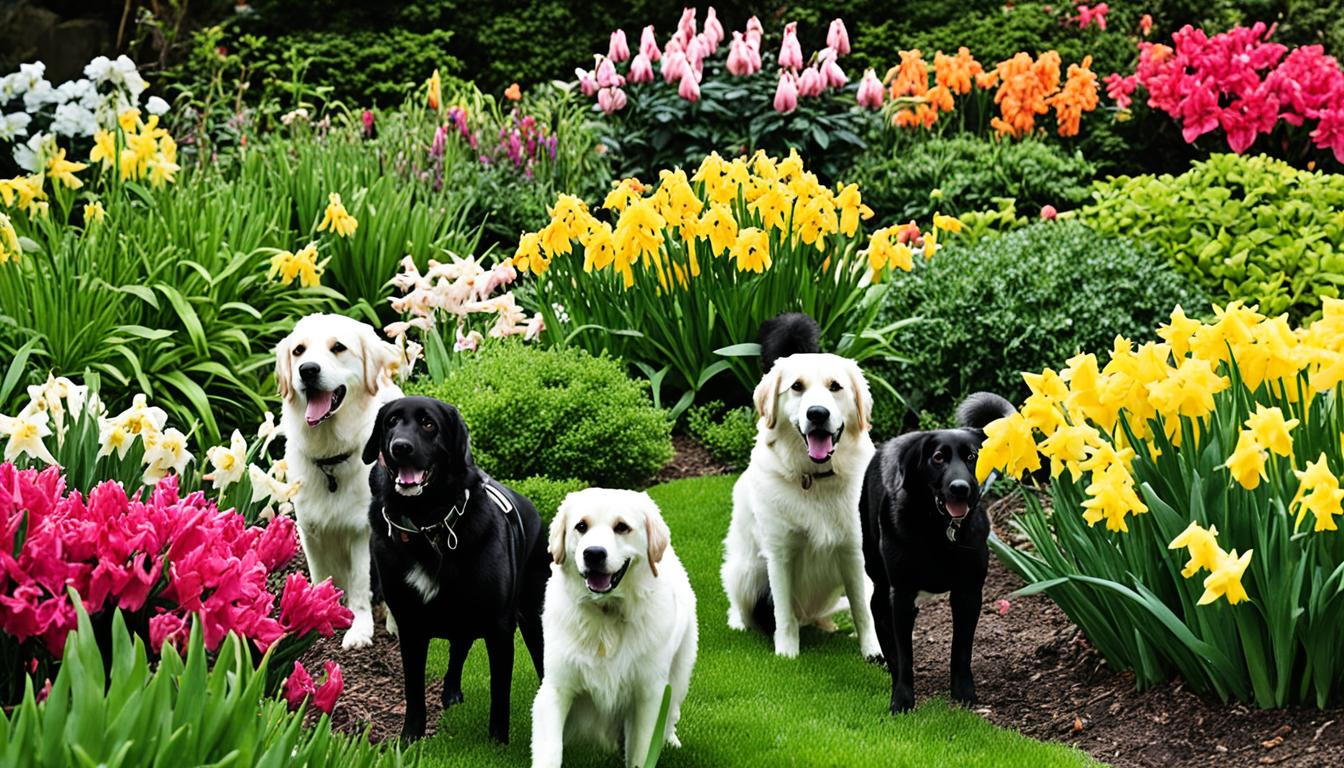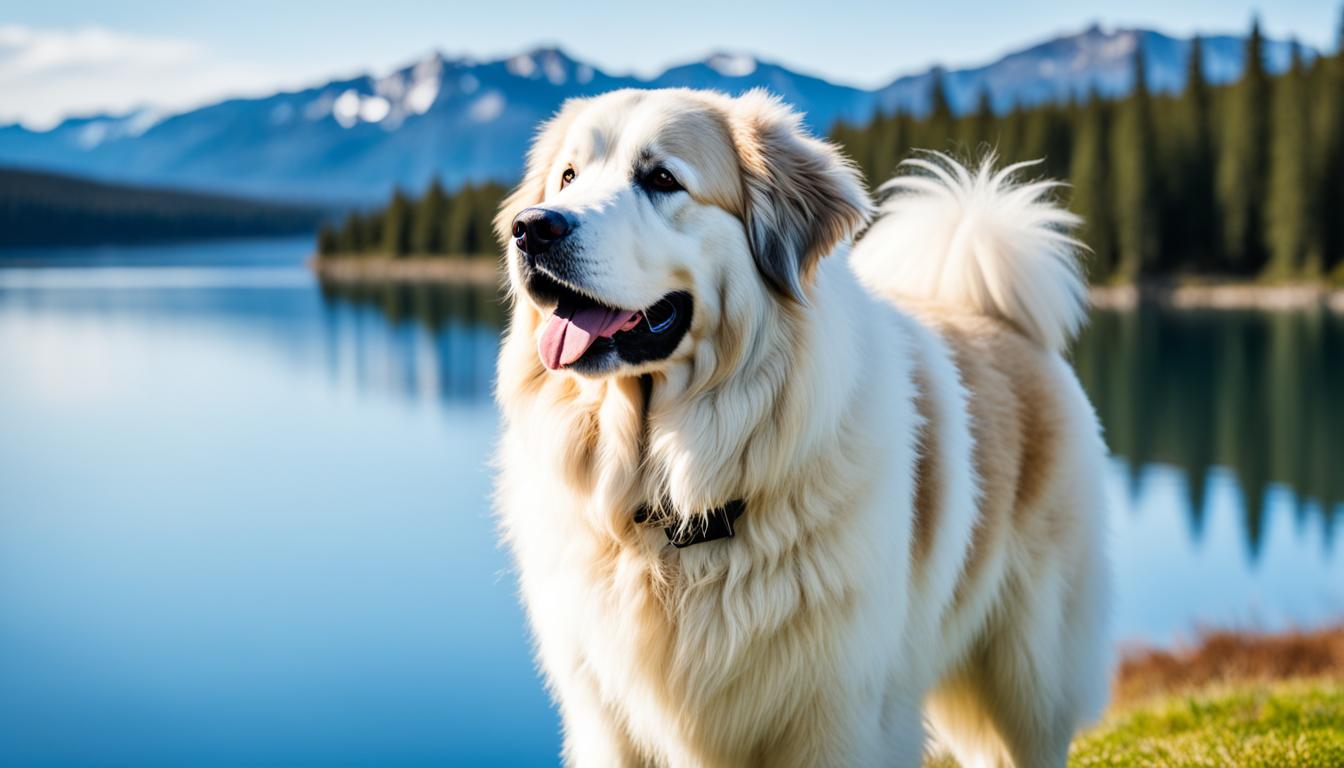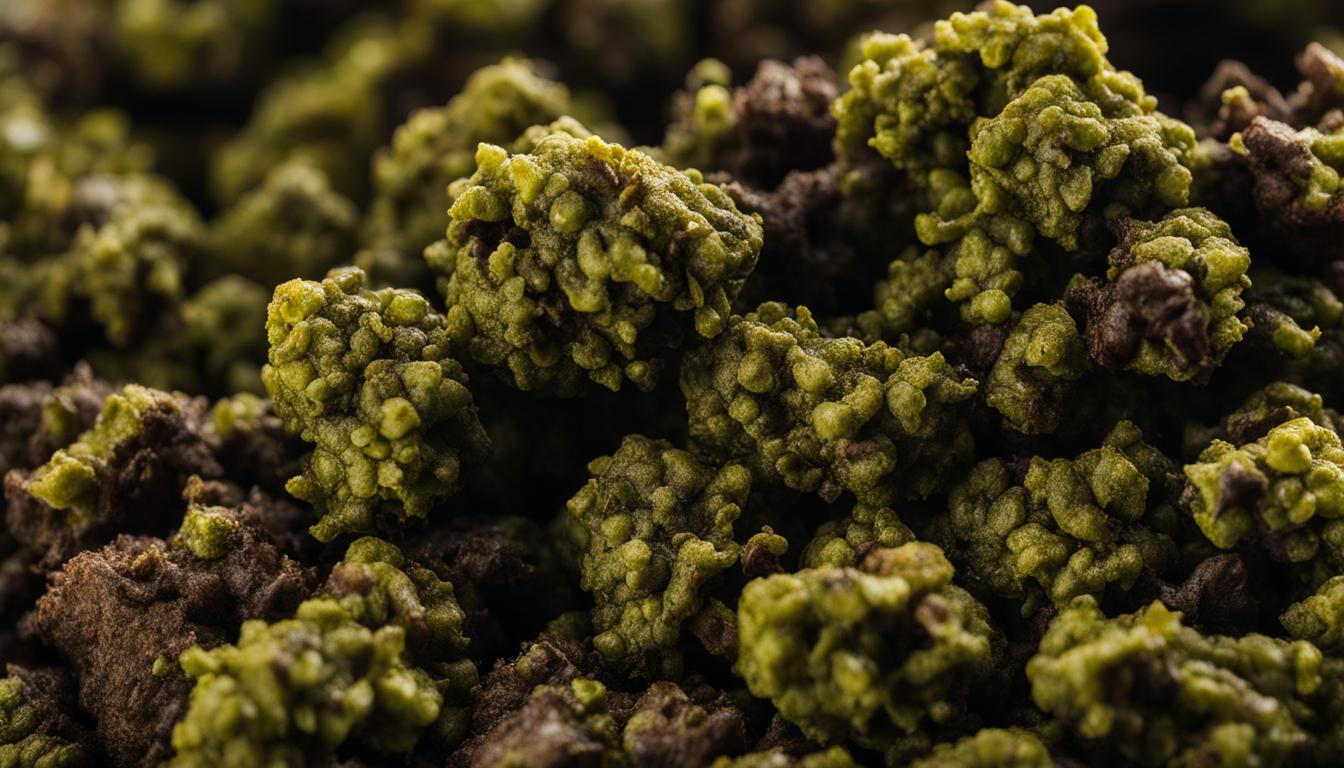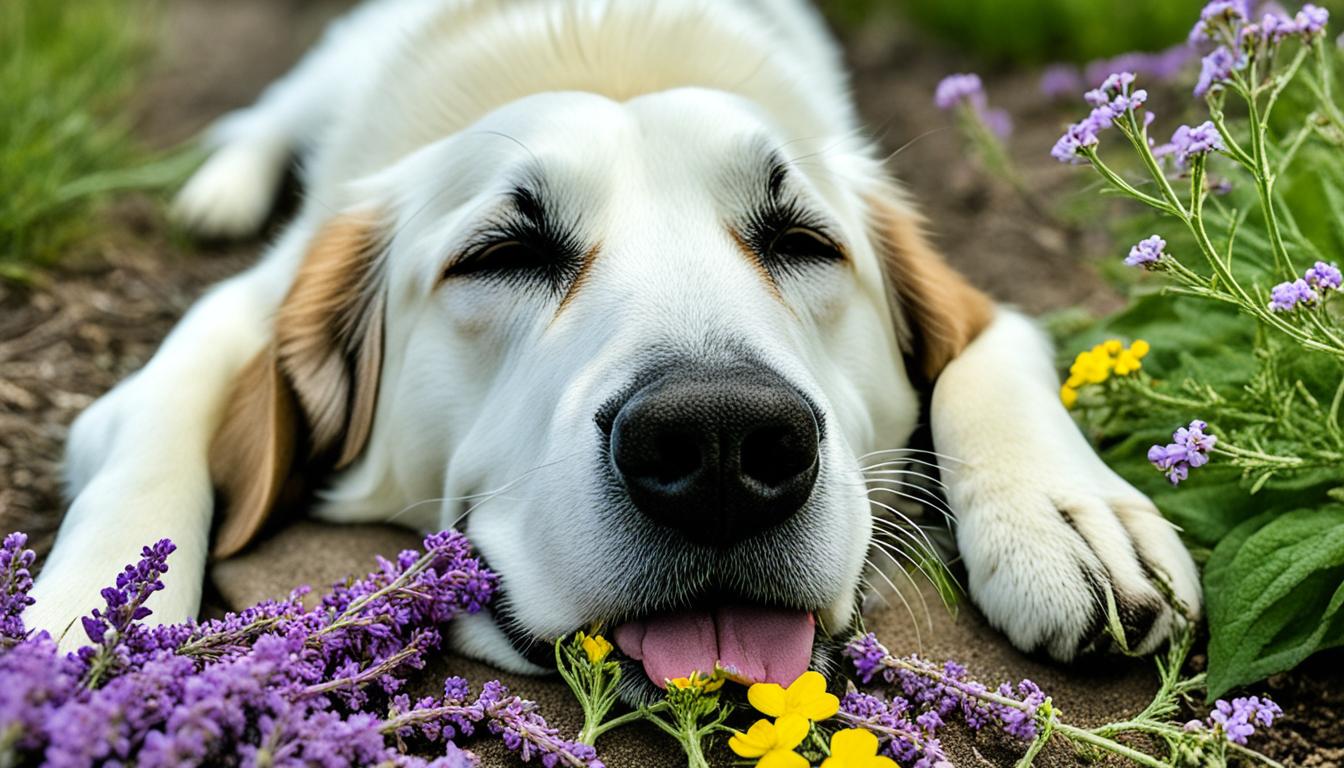Weeds can be harmful to dogs if they eat them. Some weeds like Datura stramonium (Jimsonweed) and milkweed are dangerous. Dog owners should know these plants and keep their pets safe outdoors.
Key Takeaways:
- Weeds can be poisonous to dogs if consumed.
- Datura stramonium (Jimsonweed) and milkweed are two common toxic weeds for dogs.
- Dogs may show signs like throwing up, diarrhea, and feeling weak if they eat bad plants.
- If your dog eats a bad plant, getting help from a vet fast is vital.
- To protect dogs from plant poison, make sure your garden and yard are safe for them.
Common Poisonous Weeds for Dogs
Dogs love to explore their surroundings. This includes the backyard or nearby gardens. Unfortunately, some plants and weeds are toxic to dogs if they eat them. It’s important for pet owners to know the common poisonous weeds for dogs. They need to take steps to keep their pets safe.
One highly toxic weed is Datura stramonium. It’s also called Jimsonweed, Devil’s Trumpet, or Thorn Apple. This plant has alkaloids that are very poisonous. If dogs eat any part of this plant, they could get very sick. They might have symptoms like wide pupils, a fast heart, seizures, or even death.
Another toxic plant is milkweed. It’s important for monarch butterflies but bad for dogs. If a dog eats milkweed, it might throw up or have diarrhea. It can also cause other bad symptoms.
Keeping dogs away from these bad weeds is important for their safety. Owners should know how to spot these plants. Then, they can remove them from places their dogs go. Taking dogs for walks on a leash can stop them from eating toxic plants.
To have a pretty but safe place for dogs, we need to learn. We have to know which plants are bad. Being aware of dangerous plants like Datura stramonium and milkweed helps. Pet owners can then protect their pets.
Effects of Milkweed Poisoning in Dogs
If a dog eats milkweed, they could get very sick. Signs of this illness may include:
- Vomiting: Dogs poisoned by milkweed may throw up a lot.
- Diarrhea: They might also have diarrhea, showing their stomachs are upset.
- Drooling: A dog might drool more than normal if they’ve eaten milkweed.
- Lethargy: They could seem very tired and less playful.
- Cardiovascular issues: Very bad cases can lead to heart problems or even stop it from beating.
If your dog has eaten milkweed or shows these signs, get help from a vet fast. Only a vet can tell if it’s milkweed poisoning and how to treat it. This could save your dog’s life.
Note: The image above is just for show and doesn’t show a real case of milkweed poisoning in dogs.
Getting help quickly is key. It stops more harm and helps treatment work better. How bad the symptoms are can change. It depends on how much milkweed they ate, how big and healthy they are, and how they react to the poison.
In bad cases, your dog will need fast and strong care from a vet. They might need to throw up, take medicine to soak up the poison, get fluids to clean out their body, and more. Getting help quick is very important for your pet to get better.
Seek Professional Help
If you think your dog has eaten milkweed or any poison, don’t try to fix it on your own. Call your vet or an emergency clinic right away. They’ll tell you what to do to help your dog best.
It’s better to stop poisonings before they happen. So, keep your dog away from milkweed and other harmful plants.
Treatment for Weed Toxicity in Dogs
If your dog eats a toxic weed, get vet help fast. The vet might make your dog vomit. This gets the poison out. Then, they might use activated charcoal. It stops more poison from getting into the blood.
Sometimes, dogs need special medicine to fight the poison. These medicines can make the poison less harmful. They help your dog feel better.
The vet might also give extra care if the poison is really bad. This can include water through a vein and medicine for any other sickness. These steps help your dog stay strong.
With the right care, dogs often get better in a couple of days. It’s very important to do what the vet says. Also, go back for check-ups to make sure your dog is fully healed.
Common Toxic Plants for Dogs
Many plants and flowers are harmful to dogs. Dog owners must know which ones. These plants can make your dog sick:
- Azalea: These pretty shrubs can harm your dog. Eating azaleas can cause vomiting and serious heart issues.
- Daffodil: Daffodils look nice but are bad for dogs. They can make dogs very sick, even hurt their hearts.
- Rhododendron: These plants are pretty but dangerous for dogs. Eating them can make dogs very ill or even cause organ failure.
These are just a few plants that can hurt your dog. Others include lilies and tulips. Always check with a vet if you’re not sure about a plant.
Dogs love to explore, which can be risky. Knowing which plants are poisonous can keep them safe. Make sure these plants are out of your dog’s reach.
Prevention of Plant Poisoning in Dogs
To keep dogs safe, take steps in your garden and yard. Use dog-safe gardening tips and pet-friendly landscaping. This keeps your furry friends safe. Here are some key strategies:
1. Pet-Proof Your Garden
Make sure toxic plants are out of reach. Find out which plants are bad for dogs, like azaleas, daffodils, and rhododendrons. Get rid of these plants or keep them away. Use safe or fake plants as alternatives.
2. Limit Access and Supervise
Don’t let your dog near plants without you around. Use barriers or fences so they can play safely. Always watch your dog in new places to avoid plant dangers.
3. Educate Yourself and Your Family
Learn about harmful plants in your area and tell your family. Knowing the dangerous plants helps you make smart choices. Stay informed to keep pets safe.
Note: It’s best to prevent plant issues before they happen. Taking these steps cuts down the risk of dog poisoning. It makes your outdoor area safe for pets.
| Pet-Safe Plants | Toxic Plants |
|---|---|
| Roses | Azaleas |
| Sunflowers | Daffodils |
| Lavender | Rhododendrons |
A pretty garden and pet safety can go together. Using dog-safe gardening tips and pet-friendly landscaping creates a safe space. Your pets can enjoy and explore without getting sick from plants.
Recognizing Symptoms of Plant Poisoning in Dogs
Knowing the signs of plant poisoning in dogs is key. It helps you get them help fast. Look out for signs that your dog ate toxic plants. This is crucial to keep them safe and healthy.
Signs of Gastrointestinal Distress
Stomach issues are common signs of plant poisoning. These include throwing up and diarrhea. If your dog’s bathroom habits change or they throw up a lot, it might be plant poisoning.
Behavioral Changes
Changes in how your dog acts can also mean plant poisoning. They might seem too tired or too restless. Watch for signs like pacing a lot or having no energy. These could mean trouble.
Physical Symptoms
Dogs poisoned by plants might shake or have trouble breathing. If your dog is shaking or can’t breathe right, they need a vet fast.
Sometimes, dogs show many symptoms at once or over time. How bad and what symptoms show up can change. It depends on the plant and the dog.
If you think your dog ate a toxic plant, act fast. Call your vet or an emergency clinic. They will tell you what to do next. They might make your dog throw up or give them medicine to help get rid of the poison.
Precautions for Outdoor Hazards
When we take our dogs outside, we must be careful. It’s not just plants that can harm our pets. There are other dangers in the outdoors that can hurt our furry friends. We need to know these dangers and protect our dogs.
Hazard 1: Conkers and Acorns Poisoning
One danger outside is when dogs eat conkers (horse chestnuts) and acorns. These might look safe, but they are not. They have poison that can make dogs sick if they eat them.
Conkers and acorns are everywhere in the fall. This is when dogs might find and eat them. Eating them could make a dog throw up or have diarrhea. In bad cases, they can block the dog’s stomach.
We must watch our dogs closely where there are conkers and acorns. Make sure they don’t eat these things. They could be poisoned.
Hazard 2: Poisonous Mushrooms
Another danger outside is poisonous mushrooms. Mushrooms can look interesting, but some are poisonous to dogs. Some mushrooms can make dogs very sick if they eat them.
Not all mushrooms are bad, but it’s hard to tell which are safe. It’s better to keep dogs away from all mushrooms. This avoids any risk.
If your dog eats a poisonous mushroom, go to the vet right away. Signs of poisoning can include stomach pain, too much drool, hard to breathe, and organ failure.
Preventive Measures
We can do things to keep our dogs safe from these dangers:
- Keep dogs on a leash in areas with dangerous items like conkers, acorns, or mushrooms.
- Teach dogs to “leave it” or “drop it” if they find something they shouldn’t have.
- Check your yard for dangerous items like conkers, acorns, or mushrooms. Get rid of them fast.
- Make sure your dog’s play area is safe. There shouldn’t be any poisonous plants or objects.
- Talk to a vet or animal expert. Learn about dangers in your area.
| Hazard | Symptoms |
|---|---|
| Conkers and Acorns Poisoning | Gastrointestinal upset, including vomiting and diarrhea |
| Poisonous Mushrooms | Gastrointestinal distress, excessive drooling, difficulty breathing, organ failure |
Preventing Accidental Poisoning
Keeping your furry friend safe is very important. You can do this by avoiding poison risks. Here are simple but key steps to protect your pooch:
Supervision and Awareness
Watch your dog closely to prevent poisoning. Keep an eye out, especially in new places or with other pets. Dogs like to explore, which could be dangerous. If they find something bad, stop them right away.
Educate Yourself and Your Family
Know what’s bad for dogs. Teach your family about toxic foods, plants, chemicals, and meds. Being informed helps stop accidents. Keep dangerous stuff away from your pup.
Secure Bins and Waste
Dogs sometimes get into trash. To stop this, make sure your trash bins close well. A good lid on the bin can keep your dog out. This helps prevent them from finding poison.
“Supervising your dog, educating yourself about toxic substances, and securing bins and waste are key to preventing accidental poisoning in dogs.”
Using these steps, you can keep your dog much safer. Always try to prevent problems. It’s the best way to care for your dog’s health.
What to Do If Your Dog Is Poisoned
If you think your dog has been poisoned, stay calm. Quickly call your vet or an emergency clinic. Acting fast is key for your dog’s health.
Tell the vet about what your dog might have eaten. This info helps them figure out how to help. They will tell you what to do next to help your dog.
The vet may have your dog vomit to get rid of the poison. Or they might use activated charcoal to soak up the toxins. They will pick the best way to help your dog. Quick actions can save your dog’s life.







